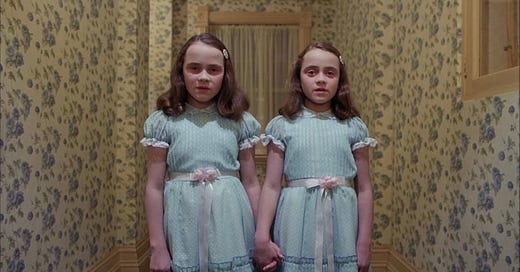Defining Favourites: The Shining (1980)
Stanley Kubrick's take on Stephen King's beloved horror novel is a sharply self-critical work from beginning to end.
Welcome to my Defining Favourites, a section dedicated to essays about films that I feel confident in calling favourites in some way or another - akin to Roger Ebert’s “Great Movies” reviews. These essays are for paid subscribers, so if you would like to read more beyond the free preview, please consider subscribing.
Directed by Stanley Kubrick
Screenplay by Stanley Kubrick, Diane Johnson, from the novel by Stephen King
Produced by Stanley Kubrick
Starring Jack Nicholson, Shelley Duvall, Scatman Crothers, Danny Lloyd
Premiere Date: May 23, 1980
Running Time: 144 minutes
On a first watch of Stanley Kubrick’s The Shining, it’s hard to forget the image of Jack Torrance smashing a bathroom door with an axe before he shouts “Here’s Johnny!” when peeking his head out through the door. It’s one among the most striking film images through the history of the medium, and it’s enough to certify The Shining as one of the greatest horror movies ever made. It’s simply one of the best films ever made on a count of its careful observations of solitude and isolation from society, but perhaps much like the Stephen King work which Kubrick had adapted, it is an endlessly self-critical work too. It’s self-critical in ways that Kubrick’s perfectionist philosophy with filmmaking only find themselves bleeding into how he approaches the loosening grasp on reality which Torrance himself is experiencing, making a perfect statement about artistry turning oneself insane.
In another particularly striking image from the film centering around Jack Torrance comes a scene in which his wife Wendy finds a manuscript that contains a familiar proverb, “All work and no play makes Jack a dull boy.” The proverb is typed in such a way that it looks almost like paragraphs within a novel, but it’s a moment that also hints at how the isolation from others, even when you’re in the company of those you love would unleash more demons from within. It’s not only a crucial aspect towards what makes The Shining so terrifying, but it also hints at a very real sense of terror that can only unfold within a domestic setting too. In a sense, it’s the perfect movie all about the terrors of the American Dream, and what values it was founded on, given the Overlook Hotel being built on top of a Native American burial ground.
Keep reading with a 7-day free trial
Subscribe to Clouds of Gaia to keep reading this post and get 7 days of free access to the full post archives.





